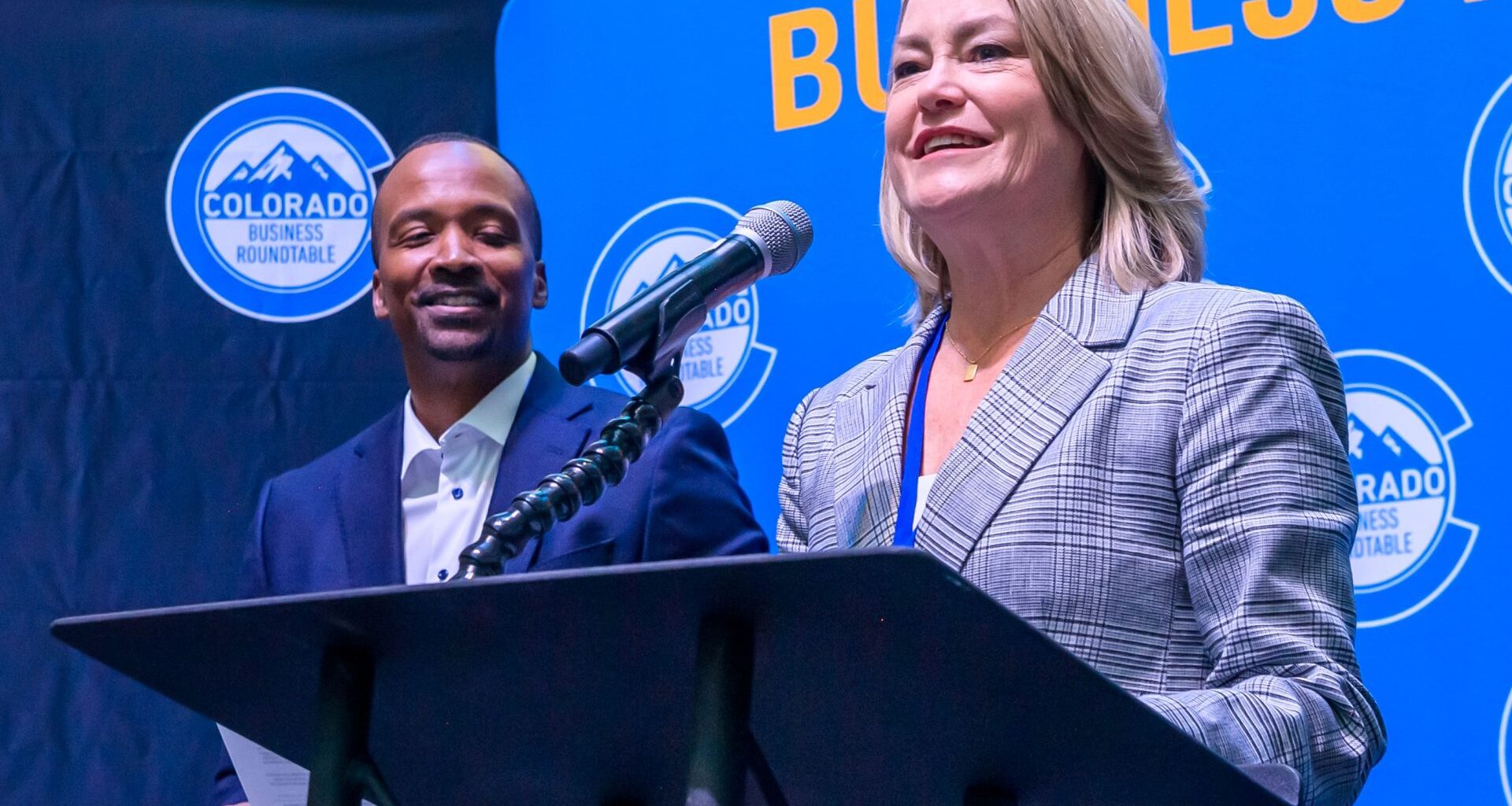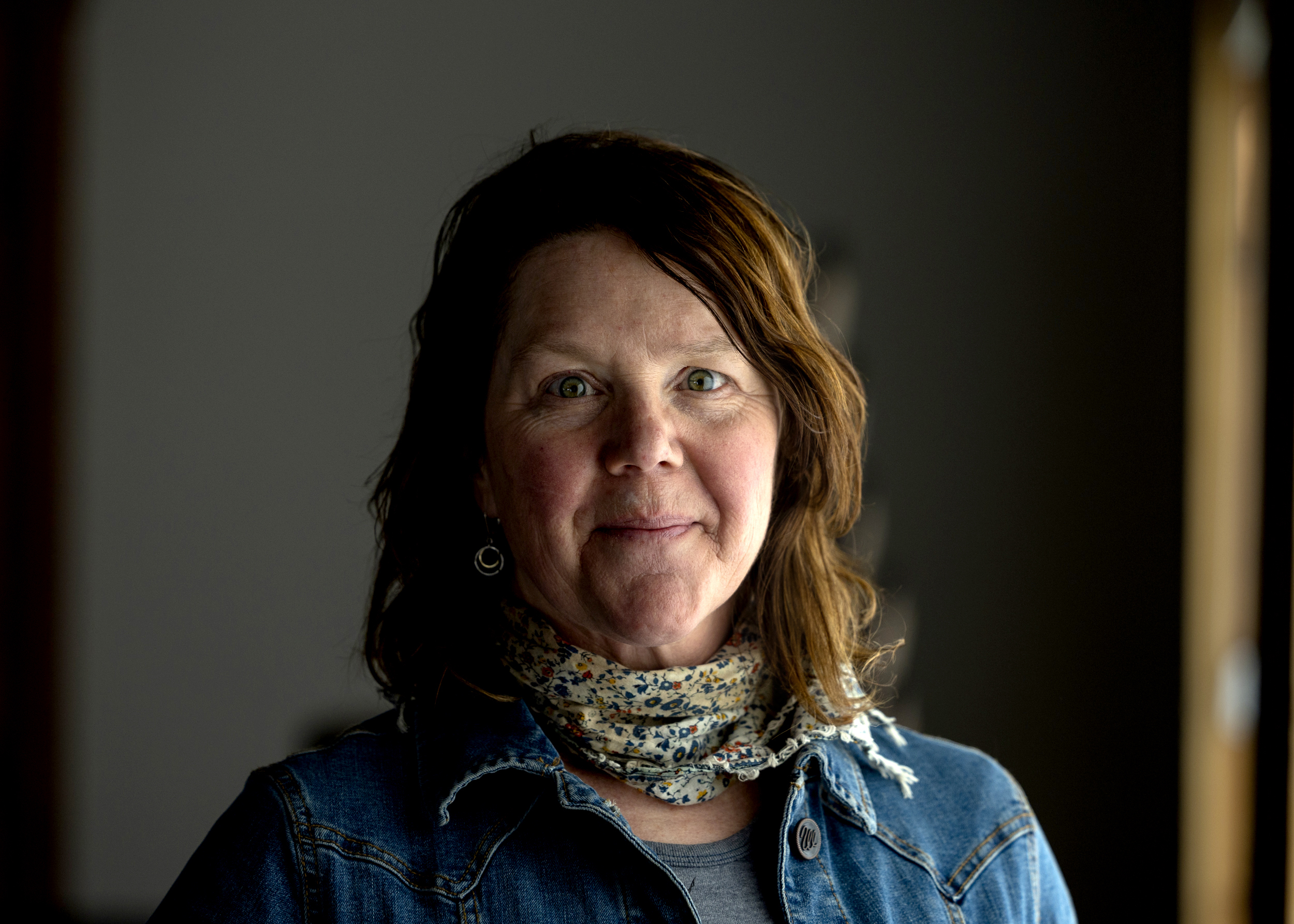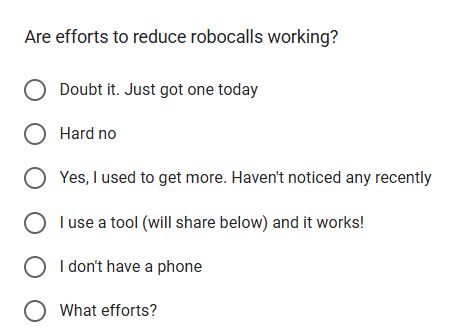Quick links: Denver inflation rises to 3.1% | Colorado business renewals down | State’s unemployment claims up | More economic data | Fake texts, coolest thing made in Colorado
Word clouds carry more weight for the people who study the insights of Colorado business execs than you might think — why else would they be in executive summaries?
And the ones that came out of the inaugural Fall 2025 Executive Outlook Survey conducted by the Colorado Business Roundtable weren’t exactly brimming with words that inspire.
The 50 executives polled for the survey used words like “negative,” “uncertainty” and “technology” to reflect their views on Colorado’s current business climate, and words like “dynamic,” “entrepreneurial” and “growing” to express their views on the national business climate.
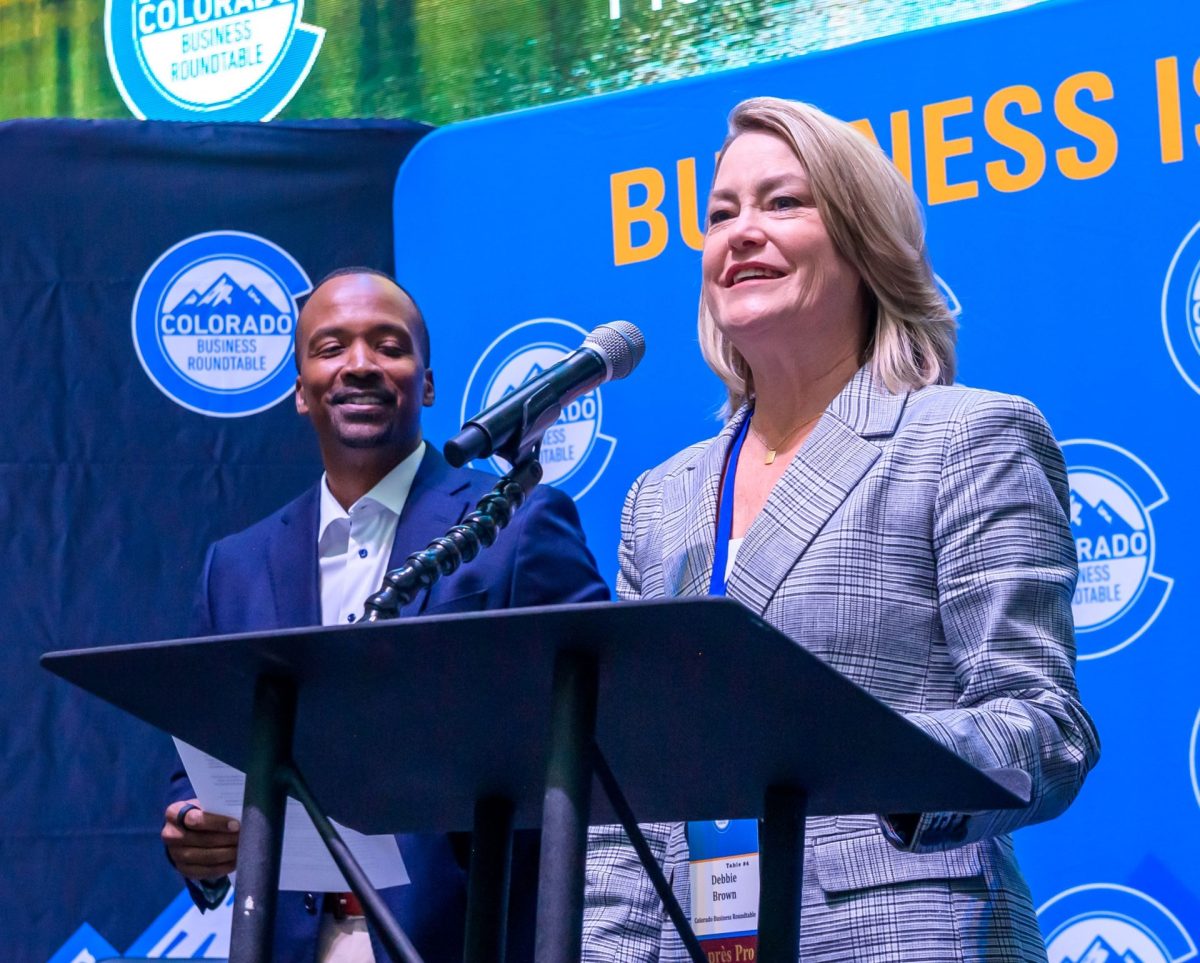 Debbie Brown, president of the Colorado Business Roundtable addresses a crowd at the Denver Museum of Nature and Science Wednesday, October 22, 2025, while Darius Wise, president and CEO of Red Rocks Credit Union looks on. (Courtesy, Colorado Business Roundtable and InSync Photography)
Debbie Brown, president of the Colorado Business Roundtable addresses a crowd at the Denver Museum of Nature and Science Wednesday, October 22, 2025, while Darius Wise, president and CEO of Red Rocks Credit Union looks on. (Courtesy, Colorado Business Roundtable and InSync Photography)
And two things are certain based on the survey by the Roundtable that’s a pulse check on how business leaders view the economic environment, policy landscape and employer-specific expectations in the colorful state.
“We are built around the same adventurous spirit and problem-solving that defines Colorado,” Debbie Brown, president of the Colorado Business Roundtable, told a crowd of legislators, business leaders and Conor Hall, director of the state Outdoor Recreation Industry office, at the Denver Museum of Nature and Science on Wednesday. “But two-thirds of respondents expect our state business climate to worsen” citing regulation, cost of doing business and affordability as major challenges.
Karla Nugent, chief revenue officer for the electrical contracting Weifield Group, in Centennial, said Colorado businesses are navigating uncertainties like rising costs, shifting policies, changing technologies including AI and “an ongoing struggle to attract and retain talent — while trying to stay competitive, innovative and resilient in a rapidly changing economy.”
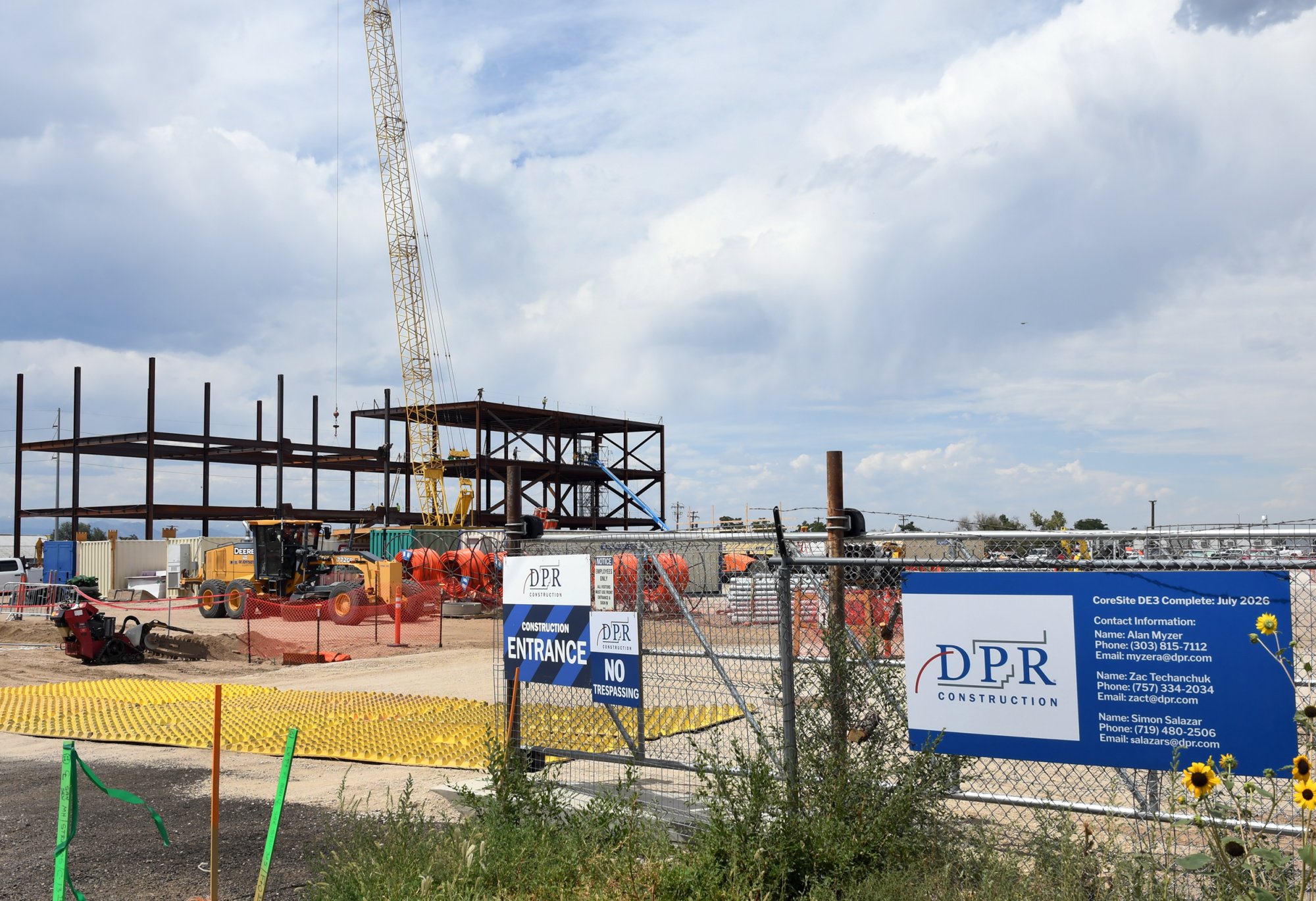 Construction continues on the Denver-based CoreSite three-building data center and technology campus at 5050 N. Race St. north of downtown Denver near the National Western Complex on Aug. 7. (Kathryn Scott, Special to The Colorado Sun)
Construction continues on the Denver-based CoreSite three-building data center and technology campus at 5050 N. Race St. north of downtown Denver near the National Western Complex on Aug. 7. (Kathryn Scott, Special to The Colorado Sun)
However, dig a little deeper into the report and the findings are mixed.
35% of executives surveyed expect the U.S. business climate to decline over the next six months, while 65% expect the state business climate to trend downward.
65% say state policy is having a negative impact on business versus 47% blaming national policy.
50% expect sales to increase in the next six months, while 18% anticipate a decline.
50% also have no plans to change their spending in Colorado for the next six months, though 27% do plan to lower their spending or investment.
Brown blames the rather glum report on the “layering effect of cost of doing business over several years, starting with big shifts in employee law that set Colorado apart from other states.”
One example she cited is Proposition 118, voted into law in 2020 and enacted last year that guarantees all workers the right to paid family and medical leave when they can’t work due to serious health or caregiving needs. The law hasn’t been as popular as expected, however, according to data from the first six months of the new paid-leave program.
Intricacies around the state’s 2024 law creating consumer protections for artificial intelligence are “also setting Colorado aside as a place it’s much harder to do business in,” Brown said, so much so that she’s “heard some businesses talking about a digital bypass for working in all states except Colorado in the future.”
 A packed house of business execs and industry leaders Oct. 22 gathered the Denver Museum of Nature and Science. (Courtesy Colorado Business Roundtable and InSync Photography)
A packed house of business execs and industry leaders Oct. 22 gathered the Denver Museum of Nature and Science. (Courtesy Colorado Business Roundtable and InSync Photography)
So what does that mean for the future? Probably not what you think.
According to the report, 60% of business leaders expect to maintain or grow their Colorado workforce, thanks to the state’s “powerful assets” including “entrepreneurial spirit, collaborative culture, and strong talent base,” said Jenifer Waller, president and CEO of Colorado Bankers Association.

➔ Earlier: Colorado business leaders’ outlook dims again
The latest economic data we found about Colorado
While a lot of economic data is on hold during the ongoing federal government shutdown, some of it began trickling out Friday.
Denver-area inflation was up 3.1% in September. That’s a whole percentage point higher than July’s 2.1%, which is the last time the Bureau of Labor Statistics reported Denver’s change in the Consumer Price Index.
That’s also slightly higher than the nation’s rate, which was released Friday. U.S. inflation rose 3% in September from a year ago, a bit above the 2.9% in August. The increase was less than expected from new tariffs that went into effect in August, but some economists theorized that companies rushed to ship orders to avoid the new tax.
 Morning coffee customers file through the Coffee Bear coffee shop on Greene Street in downtown Silverton on Oct. 1, 2021. (William Woody, Special to The Colorado Sun)
Morning coffee customers file through the Coffee Bear coffee shop on Greene Street in downtown Silverton on Oct. 1, 2021. (William Woody, Special to The Colorado Sun)
While many items did cost more at the national level — beef and veal prices were up 12.9%, coffee was up 18.9% — the cost of other items declined. Smartphones dropped 14.9%. Some fresh fruit prices fell 2.3%. The Wall Street Journal also pointed out that the Trump administration’s immigration crackdown may be contributing to the higher cost of services like gardening and lawn care, up 13.9%, and caring for “invalids and the elderly,” up 11.6%.
September data was gathered before the shutdown, which began Oct. 1, so an October report is unlikely. Federal workers who gather price data across the country were furloughed.
➔ A 3.1% raise for social security recipients. The Social Security Administration announced Friday that its annual cost-of-living increase will be 3.1% starting in January. That’s an average of $56 more per month for those receiving retirement benefits. >> The numbers
➔ More federal data? Try Bill Craighead, an economist and program director at the UCCS Economic Forum, shared other economic sources to check during the shutdown in his weekly video. >> Watch
In Colorado, more businesses start up, but fewer renewals
State data is also still coming in strong — or at least with mixed results.
On Monday, the secretary of state’s office said the number of people filing to start a business increased 7.2% in the third quarter from a year ago.
That’s a stat that local economists appreciate because “the better the business filings are, the more we’re hopeful about businesses starting and growing and helping the economy stay on an even keel,” said Rich Wobbekind, a University of Colorado economist from the Leeds Business School who regularly translates the trend data for the secretary.
But if there was one stat that bothered him, it was how many businesses weren’t renewing their license to maintain legal status and be considered in good standing.
For the third quarter, renewals dropped 1.8%, the first time it’s fallen in the third quarter since at least 2019. While dropping 1.8% may not seem like much, the rate is larger than the average decline for the past 20 years. About 178,290 businesses did renew, down 3,300 from a year ago. That could indicate companies are closing, going bankrupt or leaving the state.
“This is an area of concern again,” Wobbekind said. “We had tremendous surges in filings a couple of years ago when we had the very low cost to file. Some of (the decline) may be attributed to that but overall, the business renewal data is probably the weakest number in the report.”
➔ See it yourself: Colorado’s 3Q Business & Economic Indicators >> View
More local economic data
Colorado’s increasing unemployment claims in October. First-time claims for unemployment are up by nearly 1,000 people since September, according to the Colorado Department of Labor and Employment. In the first half of October, initial claims were about 3,480 for each week with continued claims about the same at 31,701 for the week ended Oct. 18. Before the shutdown, initial claims came in at 2,536. The stats:
Week of Sept. 21-27 : 2,536 initial claims, 31,507 continued claims
Week of Sept. 28-Oct. 4 : 3,254 initial, 31,097 continued
Week of Oct. 5-11: 3,479 initial, 31,047 continued
Week of Oct. 12-18: 3,483 initial, 31,701 continued
So far, 1,576 federal workers in Colorado filed for unemployment. As of Oct. 23, that is. The state’s labor department has been tracking claims from federal workers who have been laid off or are furloughed and need the extra pay, which they’ll have to pay back.
>> See chart
Denver rents fall 5%. The seven-county metro area’s average rent was $1,816 in the third quarter, down $95 from a year ago, according to the Apartment Association Metro Denver. That doesn’t include any incentives to attract new renters. Some complexes are currently offering two-to-three months free with a new lease. Such concessions averaged a 5.8% discount over a 12-month lease, the highest rate in 15 years. >> Read earlier story
September home sales in Colorado jump 8.3% in a year. That’s better than the 2% increase for the first nine months of 2025, according to the Colorado Association of Realtors. They credit the Federal Reserve lowering interest rates in September. Median sales prices were flat, at $550,000. But the data includes condos, which are still a challenge. Only 30 more condos sold in the entire state compared with a year ago to 1,550. At 74 days, they also took 10 days longer to sell at a lower price than a year ago. The median sales price was $423,473. Denver-area condos fared worse, though, with median prices down 2% to $400,000. >> Check your own county’s home sales
Colorado ranked fifth for falling credit limits. Blame higher credit-card debt, lower incomes and even inflation for Colorado scoring fifth in the nation for states where credit limits decreased the most, according to WalletHub, which tracks credit data. In the second quarter, the average credit limit in Colorado fell 14.2% to $5,149 from a year ago when it was $6,002. >> See the credit limits
Sun economy stories you may have missed
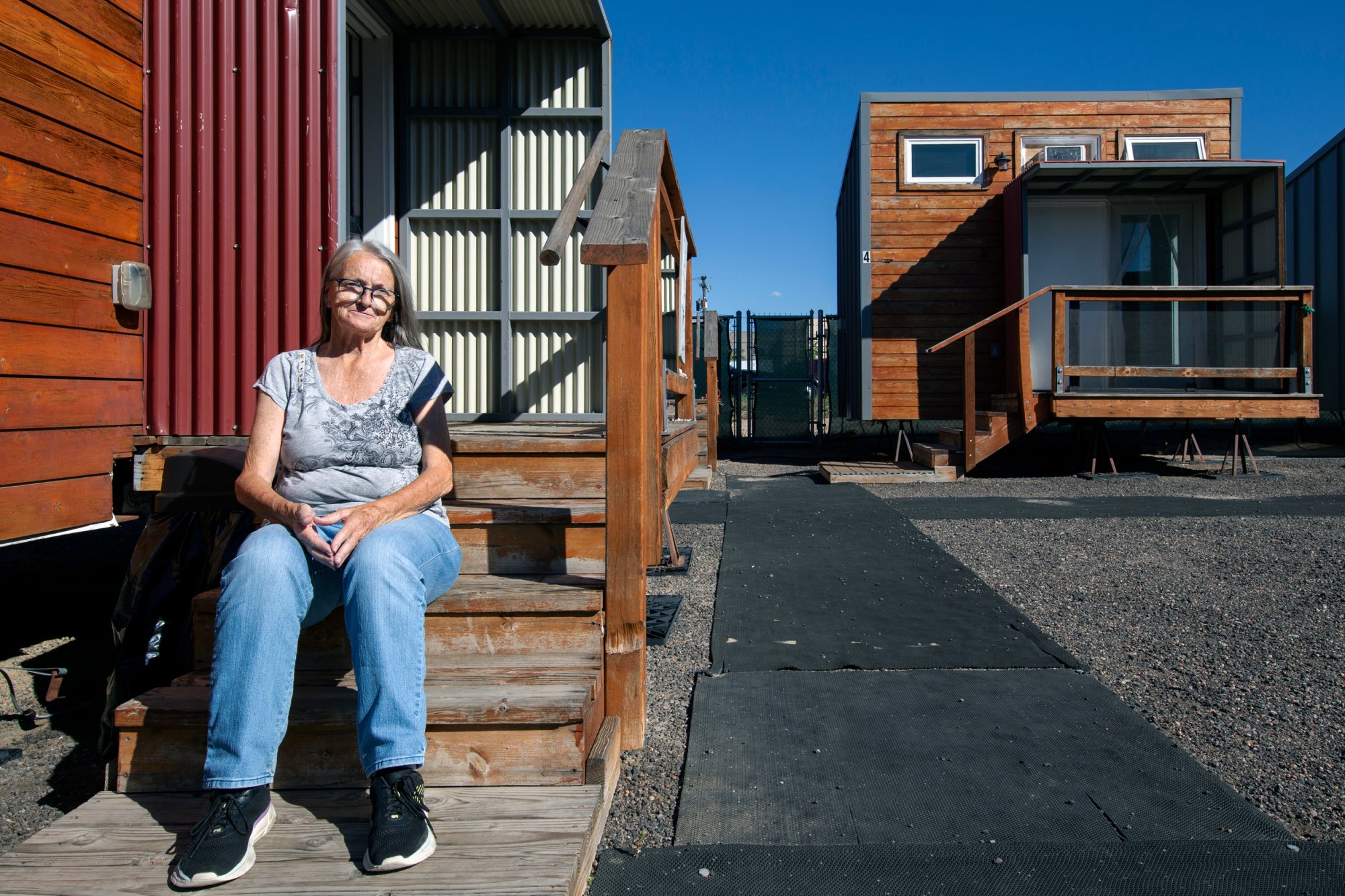 Pamela Marin sits for a portrait at the Colorado Village Collaborative in Denver. (Jeremy Sparig, Special to The Colorado Sun)
Pamela Marin sits for a portrait at the Colorado Village Collaborative in Denver. (Jeremy Sparig, Special to The Colorado Sun)
➔ Aging with nowhere to go: Increasing number of people age 65 and older are becoming homeless in Colorado. The number of retirement-aged individuals accessing homeless services in metro Denver has increased 15% since 2023. Service providers are struggling to keep up.>> Read story
➔ Bird Conservancy of the Rockies loses federal grants over mysterious DEI accusations. The nonprofit based at Barr Lake lost $1.4M budgeted to support cooperative research with federal agencies, and to match state and private grants >> Read story
➔ Polis urges Coloradans to donate to food banks as low-income families brace for November without food stamps. The governor is also asking the legislature for $10 million as 600,000 Coloradans are about to lose food stamps in “crisis within a crisis” >> Read story
 Signs near DIRT Coffee Bar urge residents to oppose ballot measure 3A, which would enshrine single-family zoning in the Littleton city charter. (Brian Eason, The Colorado Sun)
Signs near DIRT Coffee Bar urge residents to oppose ballot measure 3A, which would enshrine single-family zoning in the Littleton city charter. (Brian Eason, The Colorado Sun)
➔ It’s hard to build housing in Littleton. When the council tried to make it easier, residents revolted. After months of acrimony, Littleton voters in November will get a more direct say in city housing policy through city charter amendment 3A and a slate of mayor and council races that have become a referendum on growth. >> Read story
➔ Interior Department aims to cut almost 200 Colorado-based jobs, court filings show. The BLM’s National Operations Center in Denver, which provides technical and operational support to the agency and stakeholders, would see 87 out of 177 jobs cut >> Read story
➔ A Colorado company gets old, polluting cars off the road. Here’s how it’s helping auto parts dealers. A company called Shift helps junkyards as they put everything but the engine back to work while reducing waste to landfills >> Read story
Get local economy news in your inbox >> Sign up!
Other working bits
➔ Watch out for fake texts from state Department of Revenue. It’s so bad, the agency that oversees state income taxes issued a news release this week. The fraudulent texts ask for a response in order to get your refund. “The Colorado Department of Revenue will never send unexpected text messages requesting personal information or banking updates,” the agency said. If you do get a text? Report it to the attorney general at StopFraudColorado.gov and the FBI’s Internet Crime Complaint Center at www.ic3.gov (and no surprise, the top of the IC3’s website warns that scammers are impersonating IC3, too).
➔ FarmBox awarded “Coolest Thing Made in Colorado.” The annual Colorado Chamber of Commerce event to honor stuff made in Colorado picked the Vertical Hydroponic Farm by FarmBox Foods in Aurora as the “coolest” for 2025. The company turns old shipping containers into food-making machines. Vegetables growing vertically inside use 95% less water than traditional farms by using a recirculating watering system. One shipping container farm produces 46,000 servings a year or a similar output of a 2.5 acres farm. And it’s portable! >> Check out the winners
Got some economic news or business bits Coloradans should know? Tell us: cosun.co/heyww
Thanks for sticking with us for this week’s report. Share your 2 cents on how the economy is keeping you down or helping you up at cosun.co/heyww. ~ tamara & tracy
Miss a column? Catch up:
What’s Working is a Colorado Sun column about surviving in today’s economy. Email tamara@coloradosun.com with stories, tips or questions. Read the archive, ask a question at cosun.co/heyww and don’t miss the next one by signing up at coloradosun.com/getww.
Support this free newsletter and become a Colorado Sun member: coloradosun.com/join
Corrections & Clarifications
Notice something wrong? The Colorado Sun has an ethical responsibility to fix all factual errors. Request a correction by emailing corrections@coloradosun.com.
Type of Story: News
Based on facts, either observed and verified directly by the reporter, or reported and verified from knowledgeable sources.

